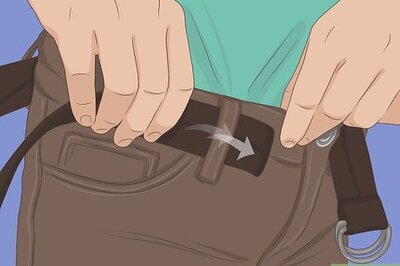
views
The Reserve Bank of India’s (RBI) six-member Monetary Policy Committee (MPC) has kept repo rate unchanged, RBI governor Shaktikanta Das announced on Thursday, February 10. With the Reserve Bank of India maintaining status quo on key policy rates such as repo and reverse repo for the tenth consecutive time, borrowers will continue to pay low rates on their home, car loans. However, depositors have no immediate respite from one of the lowest interest rates on fixed deposits as their wait has got a little longer. RBI in its bi-monthly monetary policy review kept the repo rate and reverse repo rate unchanged at 4 per cent and 3.35 per cent respectively. Policy rates were last changed in May 2020. Here is what RBI’s status quo means for existing borrowers and those looking to take new loans.
Repo-Linked Home, Auto Loans
As the RBI decided to keep repo rate unchanged, rates on home, auto loans linked to repo-rate are unlikely to increase soon unless the bank decides to increase or decrease its risk premium or margin on the loan. So loan EMIs of these borrowers are likely to remain the same.
Those who are planning to take fresh loans, should grab the opportunity soon as many banks are offering festive discounts on interest rates and processing fee waiver. Home loan interest rates now start from 6.50 per cent while car loans can be availed starting from 7.20 per cent interest. New borrowers should lock in the present prevailing low rates as rising inflation can force the RBI to change its decision on key rates in the upcoming policy review meeting.
Anuj Puri, chairman – ANAROCK Group, said: While the window of opportunity for homebuyers to avail low interest rates has been extended for some more time, it is unlikely to prevail for much longer – sooner or later, repo rates will rise. Overall, this courageous and progressive stance by the RBI factors in real-time ground realities and flies in the face of industry expectations that the repo rates would be increased.”
What Should Old Borrowers Do
Those borrowers who have home, car loans linked to BPLR, Base Rate, MCLR, may not see any change in their loan EMIs. Experts say if your loan is more than 5 years old, then it makes sense to switch it to a new lender who provides lower rates compared to your existing lender. RBI had made it mandatory since October 1, 2019, for all floating rate retail loans from banks to be linked to an external benchmark like the repo rate.
So, by switching your old home loans to repo-linked rates you may get over 1 per cent lower rates. Worth mentioning here is that one should switch his loan only if the rate differential is more than 50 basis points and the switching cost (such as processing fee and charges of the new loan) is not very high. The net benefits of switching should look attractive. You may also talk to your existing lender to switch your home loan from old regime to new repo-linked rates. If your lender agrees to do so for a minimum fee then it makes sense to switch it.
Short Term Deposit Rates Could See Upside
Whenever the interest rate cycle makes a U-turn from the bottom, it is typically the short to medium term interest rates that are likely to rise first. As far as long-term interest rates are concerned, it will take a little longer for these rates to go up significantly.
Fixed Deposit Rates
As the RBI kept repo rate unchanged, there may not be further reduction in FD rates across the tenures by banks. But some banks may alter rates on FDs of specific tenure based on demand and supply. Analysts say as FD rates are already at a historical low there may not be any further reduction in FD rates, given that real rates have become negative amid high inflation.
So, if you are planning to book an FD now or are looking to renew your existing FD, then it will be better to go for shorter term deposit, say one year or lower, so that your deposit is not locked at a lower rate for long. Whenever the short to mid term rates rise, you can start increasing the tenure of the FDs accordingly.
Read all the Latest Business News here

















Comments
0 comment